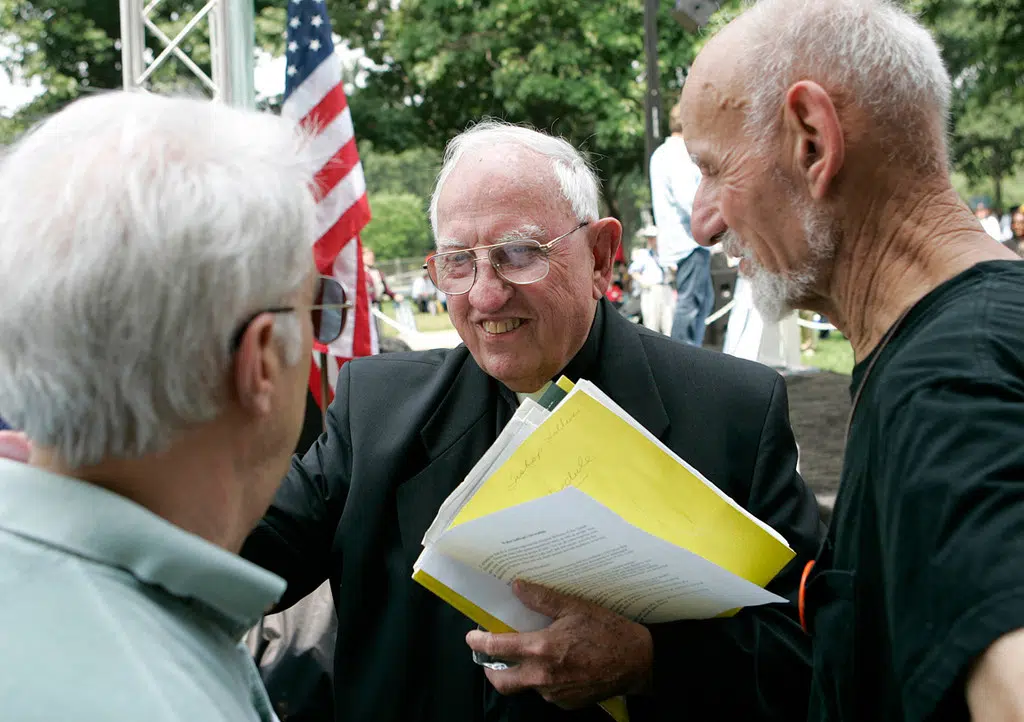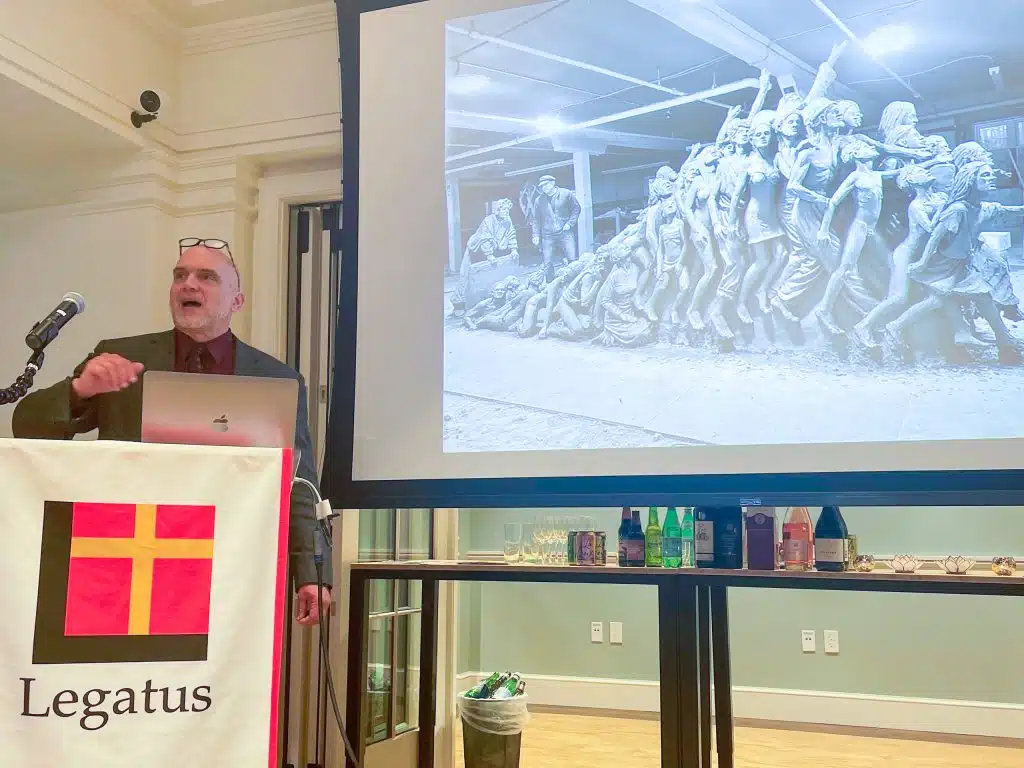WASHINGTON – Retired Richmond Bishop Walter F. Sullivan, a resilient advocate for world peace and the dignity of poor Appalachian coal miners, poverty-stricken urban residents and migrant workers working under exhausting conditions alike, died of liver cancer Dec. 11. He was 84.
A public visitation will be held Tuesday, Dec. 18, from 3-6 p.m. at Sacred Heart Cathedral in Richmond. A funeral Mass will be offered Dec. 19 at 10:30 a.m. at the cathedral.
“Along with the clergy and parishioners of the Diocese of Arlington, I join in prayer for the repose of the soul of Bishop Walter F. Sullivan, Bishop Emeritus of Richmond,” said Arlington Bishop Paul S. Loverde.
“Upon my installation in the Diocese of Arlington in 1999, I was warmly welcomed by Bishop Sullivan and worked with him in fostering the spiritual welfare of God’s people in Virginia. I shall miss his fraternal support at our yearly bishops’ retreat in January, his steadfast involvement in LARCUM and his thoughtful letters of sympathy when priests of our diocese whom he had known were called home to the Lord. His presence to and pastoral care for the people he served in the Diocese of Richmond will be remembered by the many who mourn his loss.
“With hope in the resurrection, I pray that Bishop Sullivan, a devoted shepherd here on earth, will be welcomed by the Good Shepherd into heaven, our true home,” Bishop Loverde said. “Together, let us recall the words of Christ to Martha, ‘I am the resurrection and the life; whoever believes in me, even if he dies, will live, and everyone who lives and believes in me will never die’ (John 11:25-26).”
From peace rallies to vigils outside Virginia’s execution chamber during the hours before a convicted murder was put to death, Bishop Sullivan could be found adding his voice and presence to support activists, grieving family members and victims of societal indifference.
Friends and colleagues recalled Bishop Sullivan as a man who lived out the Gospel call to love and respect all people, especially those who were often forgotten or even ignored by society.
“A man of the Gospel, he sought ‘To Unite All in Christ,'” which was his episcopal motto, the diocese said in a statement. “(He) was a priest who stood for justice, compassion and peace. ‘Well done, good and faithful servant. Inherit your master’s joy.'”
“Bishop Sullivan was a powerful and consistent voice as a defender of human dignity,” said Stephen Colecchi, director of the U.S. bishops’ Office of International Justice and Peace, who worked with the bishop for 16 years in Richmond, primarily as his special assistant.
“He was always out front, no matter what the issue. He always felt it was very important to stand with people and the people he wanted to stand with were the people at the margins of society,” Colecchi said.
Colecchi recalled Bishop Sullivan’s celebration of Mass for death-row inmates in which the sign of peace and the distribution of holy Communion was carried out through prison bars.
“It was a powerful symbol that he was committed to being with the poor and vulnerable,” he said.
Serving as the bishop-president of Pax Christi USA, the Catholic peace organization, was among Bishop Sullivan’s most visible roles outside of the Diocese of Richmond. From 1991 through 2003, he headed the organization at a time when the United States and Russia began dismantling its nuclear arsenals but also during a period when U.S.-led forces went to war with Afghanistan and twice with Iraq.
He often joined public protests of U.S. military intervention around the world, leading prayer services and vigils for peace.
Marie Dennis, co-president of Pax Christi International and former chairwoman of Pax Christi USA’s national council, credited Bishop Sullivan for introducing her to the social justice tradition of the Catholic Church in the early 1970s when she lived in Virginia and the Richmond Diocese covered the entire state. (The Arlington Diocese, which covers northern Virginia, was created in 1974.)
“He was very active about implementing the vision of the Second Vatican Council in his diocese,” Dennis told Catholic News Service.
“He was very serious about promoting equality for women in his diocese in all of the work that he did. I always felt he was happy to work with women and he was very serious about promoting the equality of women in the church.”
After becoming bishop-president of Pax Christi USA, Bishop Sullivan “was fully engaged in the work for peace that we were doing,” Dennis said. “He was a good representative of Pax Christi to the bishops of the United States.
“He was devoted to working for peace in a very open way, even as he was bishop of one of the most heavily dependent military regions of the country. It was always interesting to see him relate to people with whom he disagreed. I never saw him dismiss anyone or put anyone down. He stood his ground. He wasn’t afraid of disagreement or controversy. He was a focused advocate for peace,” she said.
Beyond activism, Dennis said, Bishop Sullivan believed in affirming the role of lay Catholics in the work for social justice, especially within his diocese.
Bishop Sullivan was named an auxiliary bishop of Richmond in 1970 and became the diocese’s 11th bishop June 4, 1974. He served for more than 29 years until retiring in 2003.
Born June 10, 1928, in Washington, Bishop Sullivan was ordained to the priesthood in 1953 in Richmond. He became chancellor of the Richmond Diocese in 1965 and rector of the Cathedral of the Sacred Heart in 1967.
In 1993, he served on the committee that wrote “The Harvest of Justice is Sown in Peace,” a statement from the U.S. bishops marking the 10th anniversary of their pastoral letter on peace.
In retirement, Bishop Sullivan continued to remain active in a number of interfaith, social service and advocacy organizations. He served on the boards of the Churches’ Center for Theology and Public Policy in Washington, Virginia Interfaith Center for Public Policy and several diocesan organizations at the time of his death.
He also served on the boards of the National Catholic Office for Persons with Disabilities, Christian Children’s Fund in Richmond, Catholic Committee of Appalachia and the Administrative Board of the National Conference of Catholic Bishops, the forerunner of the U.S. Conference of Catholic Bishops.



